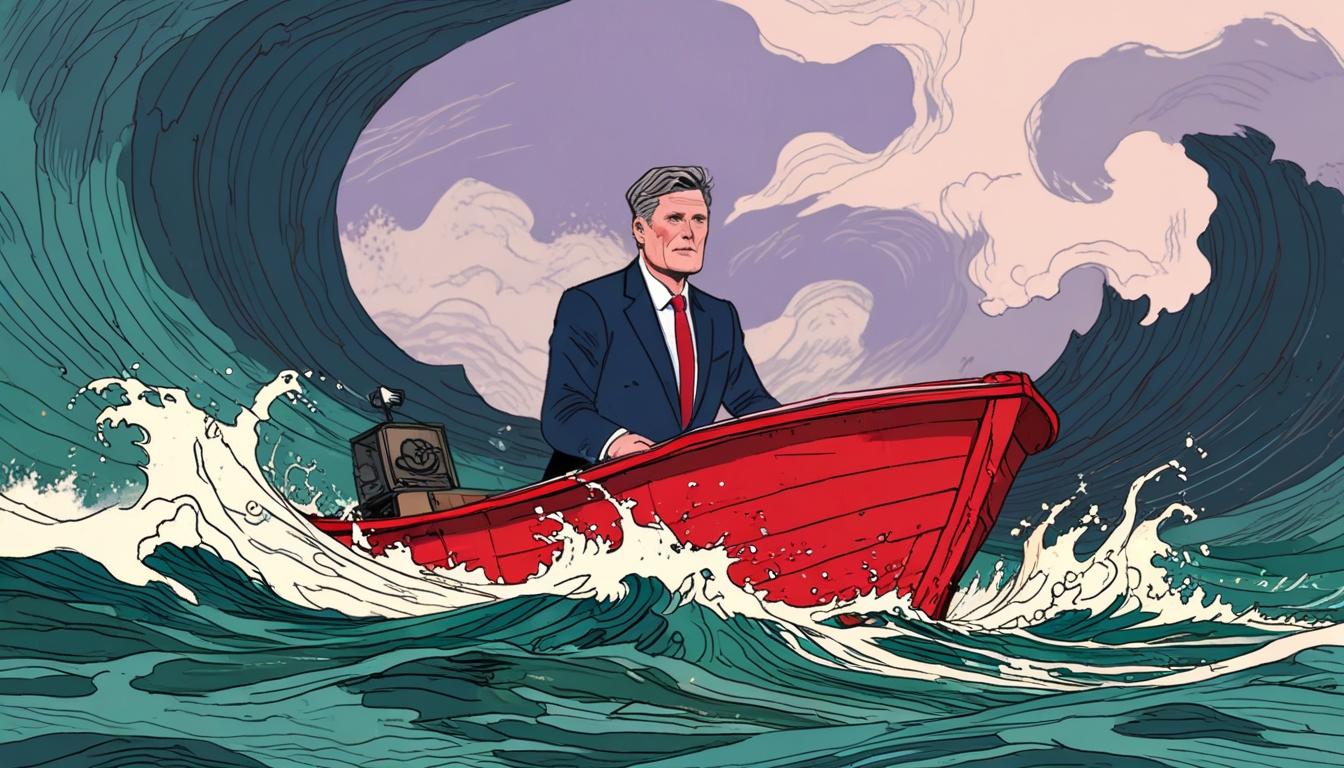Keir Starmer Faces Stormy Waters as Labour's Fate Hangs in the Balance
In a seismic shift in British politics, recent local election results have illustrated a deepening crisis not only for the Labour Party but for the entire traditional political landscape. Once characterised by a pendulum-like oscillation between Labour and the Conservatives, the current political sphere now resembles a demolition ball, threatening to dismantle the long-standing duopoly. The electoral outcomes have seen a resurgence of populist sentiments, with a formidable movement gaining traction by seizing an astonishing 30% of the national vote according to estimates. Labour, meanwhile, fell to a dismal 20%, trailing behind the Conservatives' 15% and even the Liberal Democrats. An opinion poll released shortly thereafter confirmed this trend, reinforcing the notion that both major parties are now grappling with unprecedented credibility issues.
This political turbulence draws striking parallels to a century ago when the Liberal Party was swiftly eclipsed by Labour as the primary opposition to the Conservatives. However, today’s situation is markedly different; both Labour and the Tories find themselves in perilous positions. Discontent among voters is palpable, stemming from years of mismanagement and a disconnect from their real concerns. Recent critiques focus on how voters desire a welfare system prioritising the combat against poverty over enabling dependency, a justice system that holds criminals accountable, and a government that prioritises efficiency over bureaucratic inefficiency. Above all, there exists a demand for stronger immigration controls, as dissatisfaction grows with a political class perceived as out of touch with the pressing realities faced by ordinary citizens.
The Tories, under Kemi Badenoch, have seen their credibility eroded by a dismal record in government. On the other hand, Starmer’s Labour leadership faces accusations of pushing a divisive social agenda. Following the crushing defeat at the polls, Starmer claimed to “get it,” yet many sceptics argue that his policies remain stubbornly misaligned with the electorate's needs. One focal point of contention is the unpopular decision to restrict the Winter Fuel Allowance for pensioners. This benefit, originally available to 10 million elderly citizens, is now limited to the most financially vulnerable—a move that many party figures attribute to electoral losses in traditionally Labour strongholds. This highlights a glaring disconnect as these policies fail to resonate with the very voters who depend on such support.
Despite pressure from within his party to reverse these welfare cuts, expected to save £1.5 billion annually, Starmer and his government appear adamant about maintaining a tough fiscal stance. Decision-makers have justified these cuts as necessary adjustments to tackle a budget deficit inherited from the previous Conservative administration. However, dissent is brewing, with increasing calls from former ministers urging a reconsideration of these austerity measures before further alienating potential voters.
The atmosphere of discontent reached a crescendo following comments made by Commons Leader Lucy Powell regarding “dog whistle” politics related to predatory gangs. Many observers noted that Powell’s remarks, which appeared to downplay alarming issues like the abuse of vulnerable groups, reflect a troubling disconnect from the very real concerns of working-class voters. Starmer’s continued support for Powell amidst growing outcry illustrates the complexities he faces in reconciling internal party pressures with authentic voter needs.
As Starmer looks ahead, the Labour Party's immediate future rests on navigating these turbulent waters. While some suggest he may consider a shift in policy direction by autumn, especially concerning welfare reforms, the dramatic electoral shifts signal that simply mimicking the rhetoric of rising alternatives may not suffice. The time for significant introspection and recalibration has arrived, as failure to address core voter concerns could lead to Labour facing a long-term struggle against the rising tide of populist sentiment.
In a landscape rife with unpredictability, the stakes have never been higher for Starmer and the Labour Party. The looming question remains: can he recalibrate his strategy sufficiently to halt the erosion of support, or will he find himself further entrenched in a cycle of misalignment with the electorate's needs? With new voices gaining momentum and disillusionment overwhelming traditional party loyalties, the fate of Labour hangs precariously in the balance.
Source: Noah Wire Services
